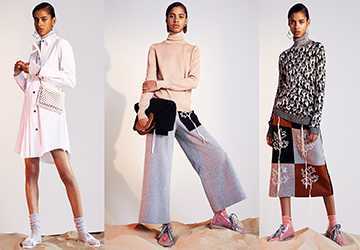In the modern world, conscious consumption is gaining momentum. People are increasingly aware of the ethical implications of their purchasing decisions. The term "ethical fashion brand" has become a buzzword in the fashion industry. But what exactly are the ethics of fashion brands? This article explores the standards of ethical fashion and provides ethical fashion guidelines to help consumers make informed decisions.
A closer look at ethical fashion
First, let's look at what we mean when discussing ethical fashion. It's a multi-layered concept encompassing aspects such as sustainable materials, fair wages, ethical treatment of workers, and transparent supply chains. However, many people think these are environmentally friendly products. It contains much more than that.

Sustainability and materials
One of the critical components of an ethical fashion brand is using sustainable materials. Ethical brands opt for eco-friendly materials instead of using synthetic materials that take years to break down. They value organic cotton, hemp, or bamboo, which are suitable for the environment and skin.
Fair wages and employee treatment
The ethical aspects of fashion also extend to the workforce. Ethical fashion companies ensure their employees are paid a living wage and work in safe conditions. These brands have certifications that confirm their ethical practices.
Transparency and traceability
Another criterion for ethical fashion is transparency. Honest brands value supply chain transparency. They provide information about their materials' sources and their products' manufacturing. This form of transparency enables consumers to make informed decisions.
The importance of ethical fashion choices
Now that we understand ethical fashion let's discuss its importance. Our decisions as consumers have a significant impact. When we buy from ethical fashion brands, we vote with our wallets for a more sustainable future.
Ecological damage
Fast fashion is one of the world's biggest polluters. Brands that adhere to ethical fashion standards aim to reduce their environmental impact. They invest in eco-friendly materials and manufacturing processes that are less environmentally harmful.
Social influence
In addition to environmental factors, ethical fashion also has social factors. Many ethical brands work directly with artisans, giving them a platform to showcase their skills and earn a living.
Personal satisfaction
Ethical decision-making in fashion involves more than just broader implications. It also brings personal satisfaction. Knowing that your purchase will not come at the expense of the well-being of others adds value to the product you purchase.
Tips for Choosing Ethical Fashion Brands
Finally, let's run through a quick guide to ethical fashion to help you make better shopping decisions.
Research brands
Before purchasing:
1. Do your research.
2. Check whether the brand meets ethical fashion standards.
3. Look for certifications and learn about their sustainability efforts.
Read reviews
Customer reviews can give you insight into a brand's ethical practices. If many people recognize the brand, that's usually a good sign.
Looking for transparency
As mentioned above, transparency is crucial. Brands that disclose their manufacturing processes and supply chains are generally more reliable.
Consider price
Ethical fashion is more expensive than fast fashion. But remember: you pay for quality and ethical practices. It's a worthwhile investment.
Other aspects to consider when it comes to ethical fashion
As you delve into the world of ethical fashion, several other factors are worth considering. These points further enrich your understanding and may be crucial to the perception of ethical fashion brands.
Environmentally friendly packaging
● Recyclable materials: Brands considered ethical fashion brands often use recyclable or biodegradable packaging. This reduces waste and is in line with their commitment to sustainability.
● Minimalist design: It is also essential to reduce the use of ink and other materials in packaging. Minimalist design is not only stylish; It is environmentally friendly.
● Transparency: Look for packaging that clearly states the materials used in the product. This kind of transparency is very much in line with ethical fashion.
Vegetarian options
● Animal product-free: Ethical brands may offer vegan options free of animal products, whether leather, wool, or silk.
● Animal welfare: Ethical brands often take a stand against animal cruelty. This demonstrates a broader ethical perspective that goes beyond human-centered concerns.
● Certification: Brands that offer vegan options often have certifications such as PETA-approved vegan, which adds to their credibility.

Including size
● Body Positivity: Ethical fashion brands often offer a range of sizes to accommodate different body types.
● Accessibility: Inclusive sizing makes ethical fashion accessible to a broader audience and makes brands more socially responsible.
Community initiative
● Local employment: Some ethical brands focus on local employment and supporting the communities in which they operate.
● Charitable work: Ethical brands often have a philanthropic side, donating some of their profits to social causes or running charitable events.
● Partnerships: Brands sometimes partner with NGOs or other organizations to increase social impact.
Making Ethical Decisions: Summary
Considering the many considerations in this ethical fashion guide, making moral choices may seem overwhelming at first. But every step you take brings us closer to a more honest and sustainable future. When you target a purchase from an ethical fashion brand that practices ethical fashion standards, you're not just buying a product but also supporting a movement.
Take it away
● Becoming an ethical consumer is not a one-time thing but an ongoing process.
● Your personal decisions, multiplied by millions of consumers, can significantly impact.
● With resources like the Ethical Fashion Guide, consumers can more easily make shopping decisions based on their values.
Diploma
These points will help you make more informed decisions and contribute to a more ethical and sustainable fashion industry. With this guide to ethical fashion, you'll be better equipped to make decisions.